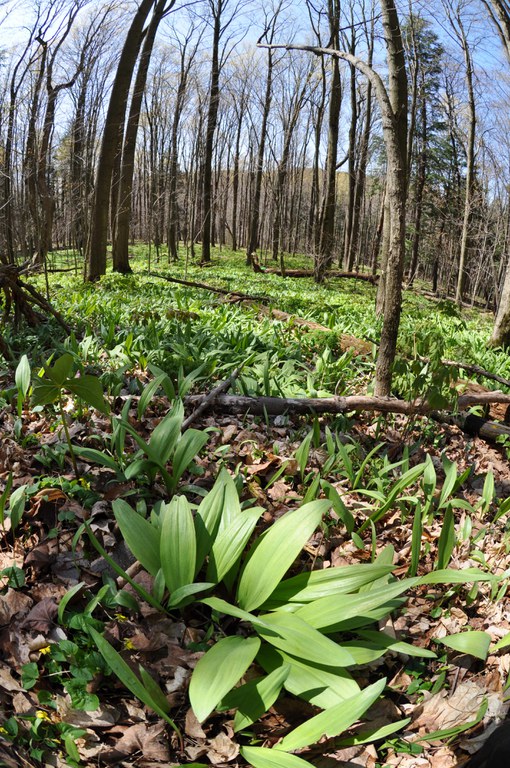Posted: February 21, 2019
Pennsylvania forestlands are home to a unique forest plant sought for its pungent onion-like taste: ramps or wild leek (Allium tricoccum).
A celebrated sign of spring, ramps can be found dotting the forest understory in sometimes extensive patches. They are recognized in springtime (March through May) because they produce leaves long before most other plants; taking advantage of sunlight before tree canopy leaf-out. By June, the leaves are typically gone, and the plants begin to flower. The clusters of flowers resemble a small "snowball" in the forest understory during the summer.
The leaves and the bulb of ramps are edible and are typically harvested before flowering. Ramps can be eaten fresh, right out of the ground. They are prepared and used in the same fashion as garden onions or garlic---only perhaps with more restraint. They can be incorporated into a variety of dishes, and may be preserved, pickled, fried, dried, and even has been included in craft-distilled Pennsylvania vodka!
Many places in Appalachia dedicate entire dinners and festivals to ramps, creating a community tradition that transcends generations. As the "eat local and seasonal" and "farm-to-table" movements have gained momentum, ramps have also enjoyed broader popularity. These days, ramps can be found in markets and restaurants in cities throughout the mid-Atlantic (and beyond), far beyond the backwoods of Appalachia. Chefs at high-end restaurants are adding locally-sourced ramp dishes to their menus and farmers' market vendors are having a difficult time keeping up with the public demand for ramps.
Ramps are a slow-growing perennial. A plant can require five or more years from seed to reach harvestable size, which discourages cultivation. Most commercial ramps are wild harvested from populations located on forestlands. As ramps continue to grow in popularity, over-harvesting of wild ramp populations could result in declines of wild populations. Appropriate steps are needed to help ensure that a sustainable industry develops featuring science-based husbandry and management of wild populations on forestlands.
With funding from the PA Department of Agriculture and PA Department of Conservation and Natural Resources (DCNR), researchers at Penn State (Eric Burkhart, Plant Sciences Instructor, Sarah Nilson, Assistant Professor of Biology, Joshua Lambert, Associate Professor of Food Science, and Cathryn Pugh, project research assistant) seek to understand the importance of ramps as an agricultural and forest resource to Pennsylvanians and to develop information that can be used to guide forest landowners and conservation managers in sustainable wild "crop" management. Accordingly, we are asking for assistance from Pennsylvania forest landowners with the following research efforts:
Market and trade:
- We are interviewing and surveying forest landowners who harvest ramps from their property either for personal use or for commercial sale at farmers markets or to restaurants and businesses. Our goal is to better understand the importance of ramps to Pennsylvania landowners. If you or someone you know grows, harvests, or sells ramps, and would like to participate in the market and trade study, please contact us. Additionally, if you happen to see someone selling ramps at a local market, grocery store or restaurant, please send us information about your sighting so we can add these "tips" to our list of places to visit or people to talk to.
Ramp cultural events:
- In springtime, there are often local events in Pennsylvania that celebrate and/or feature ramps as a seasonal fundraiser dinner or community gathering. We are compiling a list of these events for Pennsylvania. If you know of any local events in your region, such as ramp/wild leek dinners, please share information about this event with us.
Field studies of habitat and genetics:
- We are studying ramp habitat in Pennsylvania to better understand factors that influence ramp populations in the wild. This information can be used to guide landowners interested in establishing or improving ramp populations on their property. We are also measuring the amount of genetic variation in wild populations for conservation purposes and to identify how genetics and environment influence traits like ramp color and flavor. We are also gathering information about the distribution of a newly introduced non-native insect, Allium leaf miner, on ramps in the state. If you have ramps on your forestlands, please contact us if you are willing to allow data collection for these field studies.
If you have any questions or are willing to assist us with any of these research efforts, please contact project research assistant Cathryn Pugh by email or call (484) 538-3468.
Contact Information

James C. Finley Center for Private Forests
Address
416 Forest Resources BuildingUniversity Park, PA 16802
- Email PrivateForests@psu.edu
- Office 814-863-0401
- Fax 814-865-6275
James C. Finley Center for Private Forests
Address
416 Forest Resources BuildingUniversity Park, PA 16802
- Email PrivateForests@psu.edu
- Office 814-863-0401
- Fax 814-865-6275


